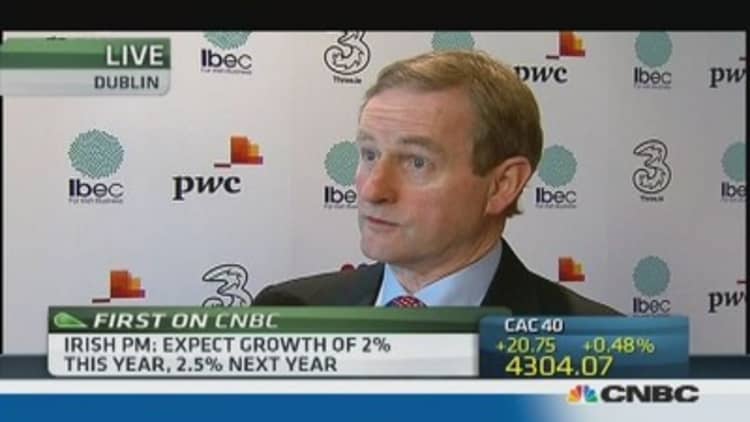
Enda Kenny, Taoiseach (Prime Minister) of Ireland has denied that international companies that come to Ireland to benefit from tax breaks known as the "double Irish" pay as little as 2.2 percent, stating the actual rate was closer to 11 percent.
Kenny was countering recent claims in new research from Trinity College Dublin academic, James Stuart, who has suggested Ireland's effective tax rate for U.S. multinationals may be as low as 2.2 percent.
"He is wrong. The methodology for determining tax differs from academic to academic," said Kenny.
"2.2 percent is not correct. The effective rate can range between 10 percent and 11.9," he said.
The "double Irish" is a tax avoidance strategy that has attracted the likes of Apple, Google and most recently Yahoo to the country and requires setting up two separate companies. One company owns intellectual property while remaining a resident of a tax haven such as Bermuda or the Cayman Islands. The other company licenses the intellectual property of the first company for a sizeable fee.
(Read more: Youth unemployment EU's 'single biggest crisis': Irish PM)
"Ireland participates with all our colleagues at the OECD," Kenny said, adding that tax law in Ireland required an "international approach".
Tim Cook, the Apple CEO visited Ireland to tour the Apple facility based in Cork earlier this month and met with Kenny to discuss the corporation's operations in Ireland. Kenny said Cook was "exceptionally happy" with the firm's operations in the country at the time of the visit.
Finding employment and creating new jobs was a key priority for Kenny, who said his government was aiming to see 50,000 net new jobs created this year and another 50,000 new jobs in 2015.
Following Ireland's exit from the bailout program, Kenny said it was "important to have a plan and strategy that is clear."
"We recognize that income tax levels are too high here. This is a priority for government, but you can only deliver it if you can actually pay for it," he said.
"All of this will be taken into account as we prepare for the budget for 2015," he added.
(Read more: Why foreign investors are buying into Ireland)
Ireland exited its 85 billion euro ($114 billion) international bailout program in December 2013 to much fanfare, with Finance Minister Michael Noonan telling CNBC at the time that there was a sense of achievement that the economy was recovering after a period of harsh austerity measures and an overhaul of the banking system.
—By CNBC's Jenny Cosgrave: Follow her on Twitter @jenny_cosgrave


